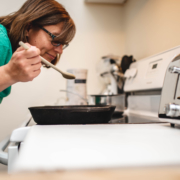How Transitional Living Paves the Road to Independence

For people with a mental health condition, the basic necessity of a stable home can be hard to come by. “The lack of safe and affordable housing is one of the most powerful barriers to recovery,” according to the National Alliance on Mental Illness. “When this basic need isn’t met, people cycle in and out of homelessness, jails, shelters, and hospitals. Having a safe, appropriate place to live can provide stability to allow you to achieve your goals.”
Finding stable and safe housing for clients is an important aspect of the treatment model pioneered by the late Colorado Recovery founder Richard Warner. “We offer a Transitional Living Program to our patients with schizophrenia, bipolar disorder, and schizoaffective disorder,” says Ginger Robitaille, Director of Operations at Colorado Recovery.
The program includes:
- Room and funds to buy groceries to prepare meals
- A safe and healthy living environment
- Oversight by live-in therapeutic housemates
- Shopping, cooking, and dining as a group
- Learning how to manage an independent household
- Weekly house meetings
- Life skills coaching
- Individual therapy sessions
- Vocational counseling
- Recreational, therapeutic and psychoeducational groups
- Fully furnished townhomes
The program has been offered to clients progressing from residential care or intensive outpatient treatment but Colorado Recovery is now also admitting directly into transitional living clients who are ready to begin this phase of their recovery.
Key to direct admission is a careful assessment of the new client by the outpatient team that typically takes several days. “It is important to make sure that clients are ready for a transitional-living environment in an unlocked, co-ed facility,” says Robitaille. “It’s also important to remember that transitional living at Colorado Recovery means sober living.”
 “Unfortunately, we cannot admit patients into this program who are still struggling with a full-force addiction,” says June Bianchi, Transitional Living Program Manager for Colorado Recovery. “Patients should be stable in their recovery, have a good idea what medications work for them, and should able to rely on their support system.” If clients do have substance use issues, the Colorado Recovery team will help address them and help engage that support system to avoid jeopardizing their recovery.
“Unfortunately, we cannot admit patients into this program who are still struggling with a full-force addiction,” says June Bianchi, Transitional Living Program Manager for Colorado Recovery. “Patients should be stable in their recovery, have a good idea what medications work for them, and should able to rely on their support system.” If clients do have substance use issues, the Colorado Recovery team will help address them and help engage that support system to avoid jeopardizing their recovery.
Transitional-living clients benefit from an enhanced outpatient level of care. “They will be seeing a Colorado Recovery therapist and a Colorado Recovery psychiatrist,” says Bianchi. “The outpatient nurses help out with the medication schedules. That really helps keeping patients stable. It’s a pretty intensive level of care, comparable to an intensive outpatient program.”
Six Stages to Success
 Colorado Recovery utilizes six stages in its transitional living process. The first is orientation, a time to adjust to the program. “Clients identify their strengths and areas they want to work on,” explains Robitaille. “They are getting comfortable with independent transportation, time management, food shopping, preparing meals, and other life skills.”
Colorado Recovery utilizes six stages in its transitional living process. The first is orientation, a time to adjust to the program. “Clients identify their strengths and areas they want to work on,” explains Robitaille. “They are getting comfortable with independent transportation, time management, food shopping, preparing meals, and other life skills.”
In the community stage, clients get to engage with their transitional living peers and the wider community. They begin to help with meetings and meals for the transitional living program and start exploring activities and groups outside the program. “They are spending quite a bit of time with life skills coaches and vocational trainers,” says Robitaille.
In the third stage, it’s time to focus on goals. After working toward employment, volunteering, or continuing education, it’s now time to focus on some short and long-term goals. Clients get to check in with their treatment team to discuss the best options for moving forward. They can also rely on Colorado Recovery’s local community partners to help make those goals a reality.
The fourth stage is all about maintaining a routine surrounding all of the healthy habits clients are learning. This helps increase structure and stability.
The fifth stage allows clients time to reflect on how far they have come and where they are headed as they prepare to leave the transitional living program. In the final stage, clients work through logistical preparation while they enjoy lots of access to support. They work on packing, making purchases, and organizing their new home. They are now well prepared for success!
“Our mission is to help people become more independent,” says Bianchi.
If you have questions about our transitional-living program or our other services to treat schizophrenia, bipolar disorder, and similar mental illnesses, call us at 720-218-4068 to discuss treatment options for you or the person you would like to help.





